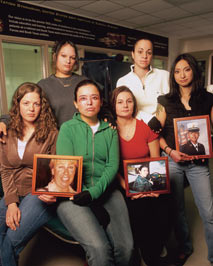
This past Friday marked the one year anniversary of the Iraq war's deadliest day for American military women.
On June 23, 2005 Lance Corporal Holly Charette, 21, of Rhode Island, Ramona Valdez, 20, of the Bronx via the Dominican Republic, and Navy Petty Officer First Class Regina Clark, 43, of Washington were killed by a suicide car bomber near Falluja.
Eleven other female Marines were wounded in the attack. (Link to article as pdf.)
From the second truck in the convoy, Marine Sergeant Kent Padmore heard a screeching of tires and an explosion, then his own vehicle braked to a stop so quickly that all dozen or so men in it went tumbling to the floor. When Padmore sat up, he saw the women's truck in flames about 250 yards away. A flight medic back in Miami, Padmore, then 38, had been good friends with Saalman, Clark and Humphrey.
Immediately he jumped from his truck and ran toward the burning seven-ton, barely aware of the bullets zinging past him; the insurgents had staged an ambush to coincide with the car bomb.
There's no way, he thought as he ran. They're all dead. He stopped - it was useless to continue. But then he pushed forward. Keep going, he told himself. He thought of how Clark couldn't wait to go backpacking with her son when she got back to the U.S., about tough-as-nails Humphrey, and about Saalman, the music-loving beauty. It can't be, he said to himself, and kept running as fast as he could.
Just as Padmore reached the scene, he saw Saalman staggering toward him, her charred, flayed hands held up before her, her eyes vacant in a blackened face. She'd lost her rifle during the explosion. "Sally, pull yourself together," he said. "You are not going to die. I promise: You are not going to die. But we need some leadership."
He watched her expression change instantly from shock to rage. "Somebody give me a fucking weapon!" she screamed. "I need a fucking weapon!" The adrenaline pumping through her body obviously masked her pain. Padmore handed her his own M16 and headed off to find other wounded marines, with the sound of Saalman firing her gun toward the insurgents ringing in his ears.
( ... )
On the evening of June 23, as word of the disaster spread, a freckle-faced young female marine stationed in Ramadi, a city near Fallujah, had approached Colonel Robert Chase, who was helping run crisis control at the command center, to say she urgently needed to talk to him. He told her the timing wasn't good, but she insisted.
Reluctantly, Chase stepped outside his office to meet with her — and in the hallway, he encountered about 10 more female marines. "Sir, we know we've had women killed," said the marine who'd first approached him. "We have to replace them — we want to go."
Chase was stunned. "I'll be candid, it was one of the most emotional and profound moments for me," he says. "I don't often work with women as an infantry officer, but at that moment, there were no women there — there were just marines."
Read the rest of the story here. (Link to article as pdf.)
Remember our Heroes.
Update Nov 2009: I am so very grateful to Mrs G of the Mudville Gazette for digging up a pdf of the article quoted here, which is no longer available at the Glamour Magazine website.

No comments:
Post a Comment
Note: Only a member of this blog may post a comment.